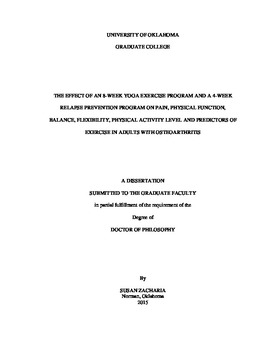THE EFFECT OF AN 8-WEEK YOGA EXERCISE PROGRAM AND A 4-WEEK RELAPSE PREVENTION PROGRAM ON PAIN, PHYSICAL FUNCTION, BALANCE, FLEXIBILITY, PHYSICAL ACTIVITY LEVEL AND PREDICTORS OF EXERCISE IN ADULTS WITH OSTEOARTHRITIS
Abstract
The purposes of this study were to determine (1) the effectiveness of a 4 week relapse prevention intervention on exercise adherence rate, exercise self-efficacy, social support for exercise, and exercise intention and (2) the effectiveness of an 8-week Hatha yoga exercise program on joint pain, joint stiffness, physical functional performance, balance, flexibility and physical activity level in adults aged 40-64 years with lower limb osteoarthritis. Twenty participants were recruited and were randomly assigned to one of two groups, an intervention group (10) and a comparison group (10). The yoga intervention was provided to all the participants in classes that were conducted for 1 hour twice a week for 8 weeks. After the completion of the yoga program, the intervention group participated in a 4-week relapse prevention intervention in which participants received encouragement and guidance to continue practicing yoga through emails and phone calls. The comparison group received no contact or information during this period, however, they were asked to continue practicing yoga. The results from the study indicated that participation in the yoga intervention significantly improved the pain, stiffness, physical functional performance, and physical activity levels of the participants. There was no statistically significant improvement in laboratory measures of balance and flexibility from pretest to posttest or from posttest to follow-up. Participation in the relapse prevention intervention was not associated with improvements in predictors of exercise (exercise self-efficacy, exercise intention, and social support for exercise) and yoga exercise adherence rate when the intervention group was compared to the comparison group.
Collections
- OU - Dissertations [9426]
